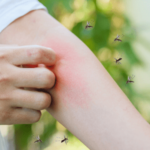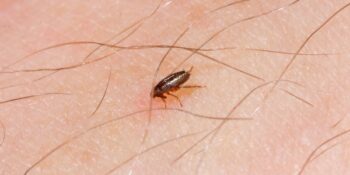
Over the past several months, pet adoption agencies have seen unprecedented adoption numbers. Pet adoptions have likely skyrocketed due to shelter-in-place orders, social distancing, and a general longing for companionship as a result of limited social interaction.
Meredith Festa is the Founder and President of the Long Island-based animal rescue Paws Unite People. Festa recently stated, “People are home trapped in their house and they can’t go out…you know a dog or cat is going to pick up on that. It’s that extra company that makes you feel a little bit better.”
Whether you’re a new pet owner, or a seasoned pet owner looking for pet safety tips, keep reading to learn about heartworm prevention in dogs, and how mosquito control plays a part in your pets’ safety.
What Are Heartworms?
Dirofilaria immitis, also known as heartworm or dog heartworm, is a parasitic roundworm that causes heartworm disease in dogs. Heartworm disease is a serious disease that primarily affects dogs, and can result in severe lung disease, heart failure, organ damage, and sadly, even death if left untreated.
In the United States, heartworm disease is most common along the Atlantic and Gulf coasts, including Long Island, however the disease has been reported in dogs in all 50 states.
How Do Dogs Get Heartworms?
Heartworm disease is transmitted through mosquito bites on dogs. The mosquito serves as the intermediate host, meaning the worms temporarily live inside the mosquito during a transition period in which they become infective, or able to transmit disease. The mosquito bites the dog, and the dog serves as the definitive host, meaning that the parasite matures, mates, and produces offspring all while living inside the dog’s body.
Female heartworms release their offspring into the dog’s bloodstream. When a mosquito bites an infected dog, that mosquito becomes infected with the heartworm’s offspring. Over the next 10 to 14 days and under the right environmental conditions, the offspring become infective, as well, all while living inside the mosquito. The offspring must travel through a mosquito in order to become infective.
When an infected mosquito bites another dog, the mosquito spreads the infective larvae to the dog through the bite wound. Then, over the next 6-7 months, the infective larvae mature into adult heartworms inside the newly infected dog.
The severity of heartworm disease in dogs depends on how many worms are living inside the dog’s body, which is called the worm burden. Typically, the average worm burden is around 15 worms, but that number can actually reach up to 250 worms, all living inside one single dog.
Heartworm disease isn’t contagious from dog to dog, meaning heartworm disease is only spread through the bite of a mosquito.
Heartworm Symptoms in Dogs
As reported by the FDA, there are four stages of heartworm disease, and the higher the class, the worse the heartworm disease and more obvious the symptoms.
Class 1: No symptoms or mild symptoms such as an occasional cough.
Class 2: Mild to moderate symptoms, such as an occasional cough or tiredness after moderate activity. Heart and lung changes are usually seen on x-rays.
Class 3: More severe symptoms, such as a sickly appearance, a persistent cough, and tiredness after mild activity. Trouble breathing and signs of heart failure are common. Heart and lung changes are usually seen on x-rays.
Class 4: Also called caval syndrome. There is such a heavy worm burden that blood flowing back to the heart is physically blocked by a large mass of worms. Caval syndrome is life-threatening, and quick surgical removal of the heartworms is the only treatment option. The surgery is risky, and even with surgery, caval syndrome is typically fatal.
Not all dogs with heartworm disease progress to Class 4, however if left untreated, heartworm disease will progress and damage the dog’s organs, eventually resulting in death.
The Best Heartworm Prevention for Dogs is a Multi-Faceted Approach
The best heartworm treatment for dogs starts with heartworm prevention. Schedule an annual veterinarian exam for your dog, who will prescribe an FDA-approved heartworm medication. Most products are given monthly, and it’s vital to keep your dog’s medication on schedule in order for it to be effective. Some medications even work as flea, tick, and heartworm prevention for dogs all in one monthly medication.
Along with heartworm prevention medication, a mosquito control service can drastically reduce your dog’s chances of contracting heartworm disease, especially during mosquito season on Long Island. While a mosquito spray is not a substitute for veterinarian-prescribed heartworm medication, it will help shrink the mosquito population in your yard.
Suburban Exterminating’s mosquito treatments are derived from natural green products, making them safe around pets and people. We recommend treatments every 3 to 4 weeks in order for the service to be most effective at eliminating mosquitoes in your yard, and reducing your chances of common Long Island mosquito diseases. Protect your pets and your family today.
Schedule a free estimate here, or call us (631) 864-6900 (Suffolk), (516) 864-6900 (Nassau County), or (631) 287-6900 (East End) to get started.





